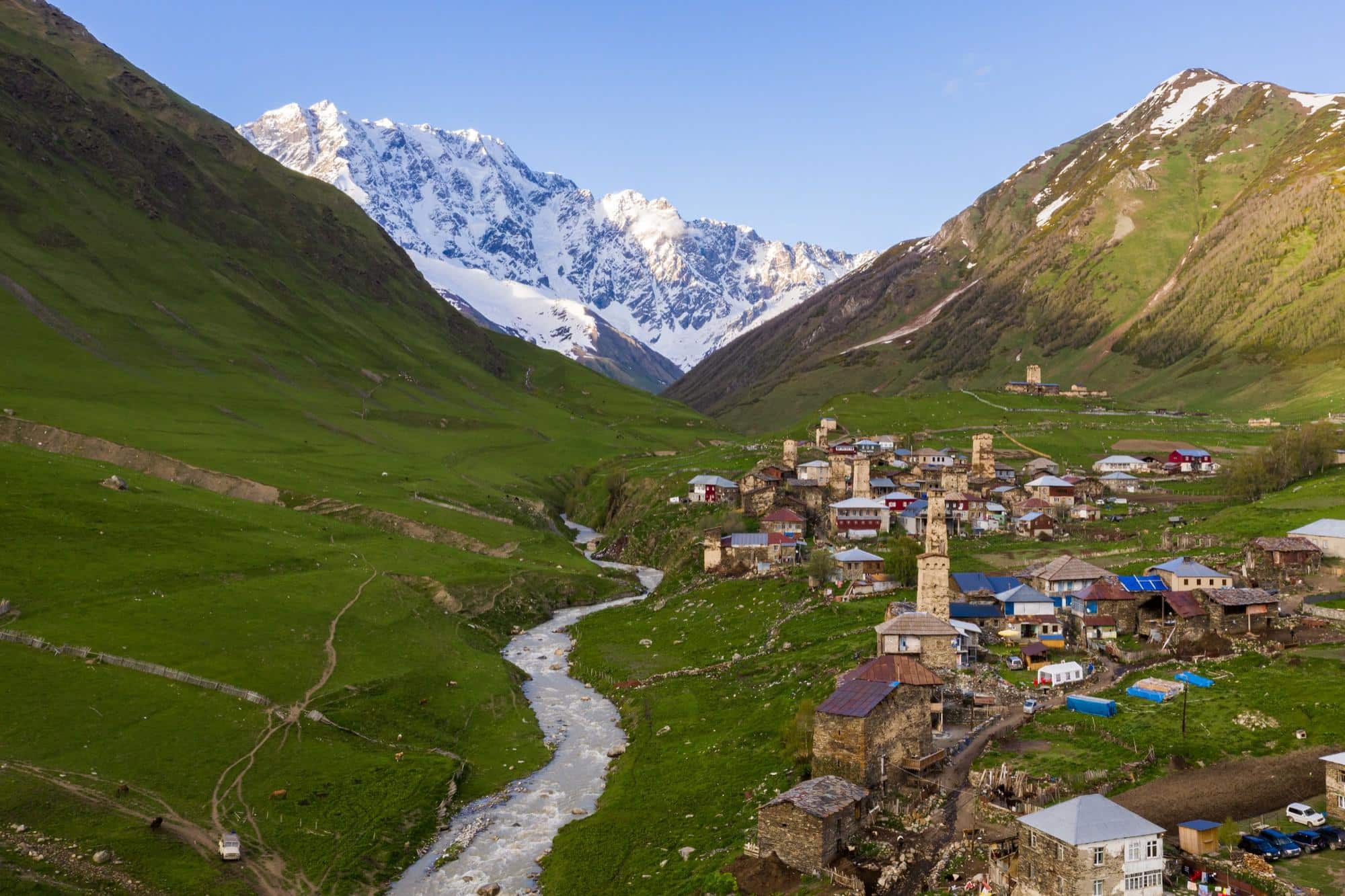Introduction
Georgia sits at the intersection of Eastern and Western Europe; a strategic location that connects by land with Russia, Turkey, Armenia, and Azerbaijan. Georgia has a rich and ancient history that goes back thousands of years, hosts some of the most astounding landscapes on the planet, and offers a blend of culinary experiences unique to Georgia.
For adventure seekers, Georgia offers thrilling outdoor experiences, including skiing, hiking and trekking in stunning sites, cave expeditions, and more. At the same time, the country provides ample opportunities for tranquility and relaxation.
Fortunately, US citizens can reside, work, and study in Georgia for up to 1 year without a visa. It is important, however, to follow state-issued precautions regarding safety in some areas of the host country, and other health-related advisories.
Relocating to Georgia from the US
Any stay longer than a year will require a relevant visa or permit depending on the reason and purpose of the stay. Some of the most common reasons for an indefinite stay can be:
- Employment
- Investment
- Family reunification
Note that a US citizen who has stayed one year in Georgia visa-free can prolong the stay immediately by paying a nominal fine and continue staying in Georgia for the next 365 days. This action is not encouraged, however, as it may lead to legal complications later on during the stay.
Work Visa
It is wise to obtain a relevant permit to stay indefinitely in Georgia. For an employment visa, the aspirant may secure a job in Georgia online or through a local recruiter. Several European and American companies have their offices in Georgia, especially those related to the energy, logistics, and power sector. Note that the duration mentioned in the employment contract will determine the validity of the stay in the country.
The requirements of a work visa include:
- Valid passport: At least 6 months validity from the time of application
- Employment contract: Detailing the job description, position, remuneration, and duration of the job
- Academic record: Applicant’s original documents pertaining to education, certificates, diplomas, etc. establishing a correlation with the job.
- Criminal record: A clean criminal record and relevant endorsements
- Personal details: Documents to establish dependents, spouse, children, last earned income, current financial status, accommodation in Georgia, health insurance, etc.
Investment Visa
Another common pathway leading to a permanent or indefinite stay in Georgia is through investment. The volume of investment varies depending on the sector or industry invested in. Some categories are as follows:
- Real Estate – US$ 100,000
- Business investment – US$ 300,000
- Bank deposit (fixed) – US$ 300,000
It is at the discretion of the visa holder to stay in Georgia or live in the home country, or move in and out of Georgia as pleased.
In recent years, the state has implemented various policies and made various reforms to the existing laws that have made doing business in Georgia very easy. The application of low tax tariffs on the import of raw materials, energy exemptions to manufacturers, leases on land for developing tourist resorts and hotels, etc., are just a few examples of how the state encourages investors to indulge in local business.
Family Reunification
A US citizen having blood relatives in Georgia can apply for long-term residency in Georgia, provided a few conditions are met:
- The applicant must be able to financially support the stay
- If the applicant is unable, then the hosts must take full responsibility for the financial aspect
- The hosts also assume full responsibility regarding the guest’s social and ethical conduct while staying in Georgia
- Ideally, the guest shall have an independent accommodation arrangement. If not, then the host must be responsible for the same
- Guest must have a valid and plausible purpose for the stay
Similar to a reunification visa is a spousal visa which is granted to the spouse of a Georgian citizen. A US citizen married or living together with a Georgian spouse can apply for this visa and stay indefinitely in Georgia.
Things to Consider Before Moving to Georgia
Now that we know how a US citizen can relocate to Georgia, it is important to consider the ground realities encircling the move. Besides the usual cultural and social differences that need consideration, issues like schooling, health system, transportation, business and job opportunities, safety & security, etc. must be addressed.
Education System in Georgia
Formal education in Georgia is divided into three segments; primary, secondary, and tertiary education. Primary education starts at 6 years of age in most cases. Grades 1 to 6 are covered in the primary phase and it is compulsory for all children residing in Georgia to attend. Primary education is imparted through public and private schools both, the curriculum may vary in both, but essentially covers subjects such as Georgian language, mathematics, everyday science, etc.
Secondary education is further split into two cycles; basic education covering grades 7 to 9, and general education from grades 9 to 10. During the basic cycle, the students learn various subjects and prepare for elective subjects to study in the general cycle.
Lastly, tertiary education includes professional degrees, diploma programs, doctoral programs, and specializations; all imparted through universities and colleges.
Among the US expatriates in Georgia, below are a few popular schools and universities:
- American International School – Tbilisi
- The New School – Tbilisi
- The QSI International School – Tbilisi
- International School – Zugdidi
- Tbilisi State University – Tbilisi
- Free University of Tbilisi – Tbilisi
- Llia State University – Tbilisi
- Georgia Technical University – Tbilisi
- Caucasus University – Tbilisi
Healthcare System in Georgia
Critically speaking, the healthcare system in Georgia was not very encouraging until recently. The state has indeed implemented reforms to make healthcare more accessible to the masses. However, the quality of healthcare in most of the country is compromised, except for major cities like Tbilisi, Kutaisi, Batumi, Zugdidi, etc.
One of the recent reforms includes the introduction of a universal health program. The program allows access to primary healthcare for all the legal residents of the country; citizens and otherwise. The treatment is offered free of charge, while the prescription drugs, may be borne by the patients.
On the brighter side of things, capacity-building programs in the private sector have created a sizeable pocket of well-trained nurses, paramedics, doctors, and consultants over the years.
The most reputable hospitals and healthcare institutes in Georgia are listed below:
- Tbilisi State Medical University & Hospital (TSMUH)
- National Center for Disease Control & Public Health (NCDC)
- Gudushauri National Medical Center (GNMC)
- New Hospitals (multiple campuses)
- Batumi Republican Hospital (BRH)
- Aversi Clinics (multiple locations)
Real Estate & Rentals
The overall property prices, rental or owned, in Georgia are lower as compared to the region. Within Georgia, property prices in major cities are higher than in the countryside or rural areas. Furthermore, prices can vary between areas and localities within a city; areas closer to the city center come at a premium as compared to suburbs.
In the capital city of Tbilisi, the average cost per square meter ranges between US$ 1,500 to US$ US$ 3,000 while in the coastal city of Batumi, the same measurement can go up to US$ 2,500 to 4,000. Similarly, a square meter in Kutaisi can come at a price of US$ 1,500.
Moreover, rent per month for a one-bedroom apartment in major cities of Georgia can range between:
- Tbilisi: US$ 500 – US$ 900
- Batumi: US$ 700 – US$ 1,000
- Kutaisi: US$ 300 – US$ 500
- Rustavi: US$ 200 – US$ 450
- Zugdidi: US$ 200 – US$ 450
- Gori: US$ 300 – US$ 500
- Poti: US$ 200 – US$ 400
Note that these rents, in most cases do not include the maintenance, water, electricity, and other affiliated charges.
Business in Georgia
As stated earlier, the government is in the process of reforming economic and business policies to encourage foreign direct investment, as well as diversify the local business environment. In this, various exemptions and privileges are offered to investors and entrepreneurs who are willing to create employment for locals through business. Capacity building of the locals in fields such as information communication technology, software development, Artificial Intelligence, etc. is another area within the scope of the state’s new economic policy.
Currently, the most lucrative businesses to indulge in Georgia are:
- Tourism & Hospitality: A wide range of services such as hotels, resorts, restaurants, rental equipment, transport, etc. fall within the ambit of the tour industry. Investing in any branch of tourism can result in a successful business story.
- Real State & Construction: Georgia needs new roads, motorways, freeways, hospitals, schools, and many other structures for cities and areas that are not currently developed.
- Agriculture & Food Processing: The weather conditions and climate of Georgia are ideal for several crops and fruits. Farmers here cultivate vast fields of irrigated land producing significant crops each season. A plant that can package and preserve farm produce can not only make space in the local and regional markets but also export to faraway countries.
- Information Technology: Georgia’s startup ecosystem is in its infancy and the youth of the country is tech-savvy. A skilled and trained workforce is readily available in the capital city.
- Power & Energy: Georgia is filled-to-brim with resources and raw materials required to produce renewable energy such as hydroelectricity, solar energy, wind energy, etc. Investors can reap great benefits by producing and exporting energy to neighboring countries.











